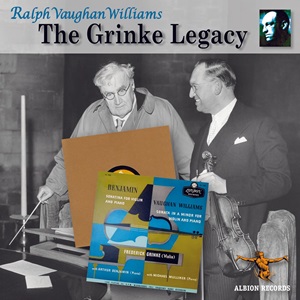
Ralph Vaughan Williams (1872-1958)
The Grinke Legacy
Violin Concerto in D minor, ‘Concerto Accademico’ (1924-25)
The Lark Ascending (1914)
Two Hymn-Tune Preludes – 1. Eventide (1936)
Violin Sonata in A minor (1954)*
Arthur Benjamin (1893-1960)
Sonatina for violin and piano (1925)**
Frederick Grinke (violin)
Boyd Neel Orchestra/Boyd Neel
Michael Mullinar (piano)*
Arthur Benjamin (piano)**
rec. 1939 (Concerto); 1940 (Lark Ascending and Eventide), West Hampstead Studios, London, UK;
1955 (Sonata and Sonatina)
Albion Records ALBCD061 [72]
Although Canadian, Frederick Grinke lived a great portion of his life in the UK. He was born in Winnipeg in 1911. He could boast good credentials, counting both Adolf Busch and Carl Flesch amongst his teachers. He later forged a three-pronged career as soloist, chamber musician and teacher. In 1937, he assumed the mantle of concertmaster of the Boyd Neel Orchestra, a post he later left to pursue a solo career. In 1939, he began teaching at the Royal Academy of Music, and during 1963-66 taught at the Menuhin School. He died in Ipswich, UK in 1987.
He’s not exactly been over-represented in the CD catalogue. Dutton has released a handful of his recordings in English repertoire such as Ireland, Rubbra and Vaughan Williams, an area in which the violinist had a particular interest. Yet he also made recordings of composers as diverse as Bach and Bartók, Rachmaninov and Smetana, amongst others.
Albion Records have here gathered together all of the violinist’s Vaughan Williams recordings in new restorations by Ronald Grames. Arthur Benjamin’s Sonatina has been included as it was paired on LP with Vaughan Williams’ Violin Sonata when originally released in 1955.
The Concerto for Violin and Strings dates from 1924-5 and bears a dedication to Jelly d’Aranyi, Hungarian violinist and grandniece of Joseph Joachim, who premiered it in November 1925. Vaughan Williams disliked the work’s original title ‘Concerto Accademico’ and later withdrew it prior to a performance by Yehudi Menuhin in 1952. It’s in three short movements. The outer movements are neoclassical in style, spiky and angular, and feel emotionally detached. The work’s finest attribute is its central Adagio, intimate, warm and radiant. Grinke contours the singing line eloquently and expressively. He’s forwardly projected in the mix, with the orchestra sounding somewhat recessed. In the outer movements, the orchestra seems more forwardly profiled.
Originally for violin and piano, The Lark Ascending was orchestrated by the composer shortly after World War 1. The first recording of the orchestrated version was made by Isolde Menges in 1928 with Malcolm Sargent. Grinke’s is the second recording, set down at the West Hampstead Studios in London on March 9, 1940. The recording was very much admired by the composer. The performance is nicely paced and not too slow, and there’s a true feeling of communing with nature. Grinke displays a beautiful clear tone, colourful and full of character. Intonation is spot on. Eventide, which follows, is the first of Two Hymn-Tune Preludes, arranged by the composer in 1936. It was the filler on the fourth side of the 78-rpm release of The Lark. Grinke is the orchestra’s leader in the performance. There’s a delightful oboe solo, yet sadly the oboist isn’t identified.
Vaughan Williams dedicated his three-movement Violin Sonata to Frederick Grinke. The work was written with the violinist’s artistry in mind. Grinke and Michael Mullinar, the pianist on this recording, premiered the Sonata in a BBC broadcast on the composer’s 82nd birthday on October 12, 1954. The rather dour first movement sounds at times agitated and windswept. Anxiety is carried forward into the Scherzo with its plentiful energy, driving rhythms and jagged articulation. The third movement is a theme and six variations. There’s an ideal balance struck between the two instrumentalists, and this 1955 recording is in remarkably good sound for its age.
Arthur Benjamin’s Sonatina of 1925 has been included as it formed the flip side of the Vaughan Williams Violin Sonata (London LL.1382 – UK LP Pressing). Here, the composer himself is the accompanying pianist. It’s a delightful score, kitted out with a wealth of lyrically pleasing material. The three movements are ingeniously crafted. The opener is passionate and rhapsodic. This is followed by a sprightly, tightly-knit Scherzo. The finale is a Rondo which smiles with joyous abandon. Grinke and Benjamin play with sensitivity and passion throughout.
This release will appeal to both fans of Vaughan Williams’ early recordings and followers of the artistry of Frederick Grinke. Ronald Grames’ standout restorations are a strongly positive factor, as are his excellent, substantial accompanying liner notes.
Stephen Greenbank
Buying this recording via a link below generates revenue for MWI and helps us keep free access to the site



















